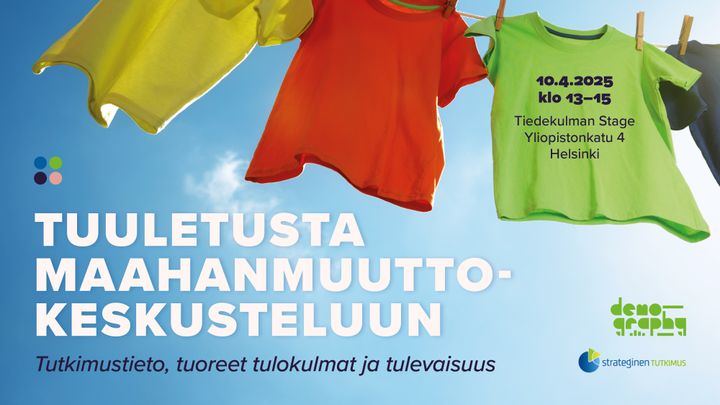Workforce or future citizens? Attitudes towards migration need a breath of fresh air
The current discussion on migration does not serve the Finnish society and its future. Political decision-makers are often caught up in current political disputes and fail to look towards the future. That is why migrants are often reduced to a problem that should be solved or a resource that should be utilised. The “Tuuletusta maahanmuuttokeskusteluun” event, organised by the DEMOGRAPHY programme on 10 April 2025 aimed to bring fresh perspectives to the public debate on migration.

Media release, 10 April 2025, embargoed until 10 April 1 pm
"Few societies would have been able to develop without people moving across borders or regions," says Seija Jalagin, University Lecturer in History from the University of Oulu.
Studies show that the employment and educational opportunities of refugees from the interwar period and their descendants improved with the development of the welfare state, but also because the state and municipalities expected them to become permanent residents.
This is the perspective from which migrants should be seen: as people who come to Finland to become permanent residents and citizens.
In many respects, Finland is a good and attractive country to live in: its strengths include good quality of life and a high level of competence. Finland is also a family-friendly country to live in.
However, attitudes towards migrants in Finland are more negative compared with other Nordic countries, also migrants do not have equal opportunities in the Finnish labour market. Finland does not always appear to be receptive.
How can Finland become more receptive?
There are ways to build receptiveness in Finland. Attitudes can be influenced by sharing information on the social impact of migration backed by research. On the other hand, each of us can promote justice and inclusion in workplaces, schools, hobbies, and neighbourhoods – and be part of creating communities where everyone can feel that they belong.
However, individual-level means are not enough, companies that employ migrants, for example, play a key role in building receptiveness in Finland.
- "The availability of skilled workforce is vital for companies, and immigration of skilled workers is one way to increase the supply of skilled workforce, innovation and the companies' productivity. Nonetheless, companies still have a lot to do in making international experts equal members of the work community," says Antti Kauhanen, Research Director from Etla.
Integration has been studied in Finland, but so far reliable information is only available regarding the effects of very specific integration-related reforms. However, researchers who have examined the effectiveness of integration services emphasise the long-term benefits.
– Some of the benefits of measures such as integration training arise over a long period of time and can be difficult to measure. Costs, on the other hand, arise quickly and are fairly easy to detect," emphasises Hanna Pesola, Chief Researcher at VATT Institute for Economic Research.
Maintaining trust is in everyone’s interest
The welfare state and its structures have played a significant role in creating trust among both immigrants and the majority population. On the other hand, as the population ages and the working-age population shrinks, migrants are becoming an increasingly important part of the future of the welfare state.
"When the majority population can rely on a well-functioning welfare system that takes care of everyone, prejudice towards migrants may also be reduced." says Maria Vaalavuo, Senior Researcher at the Finnish Institute for Health and Welfare.
In future Finland, good and trust-building relations between population groups are the result of today’s actions.
See also
Discussion session: Tuuletusta maahanmuuttokeskusteluun 10 April 2025, Think Corner, Helsinki.The event was organised by the DEMOGRAPHY programme funded by the Strategic Research Council
Study: Mitä oikeastaan tiedämme maahanmuuttajien kotoutumispolitiikan vaikuttavuudesta? — The Labour Institute for Economic Research LABORE
Hanna Pesola, Matti Sarvimäki and Tuomo Virkola
Study: Skilled foreign workers in Finland, Etla report Kauhanen Antti, Maczulskij Terhi, Riukula Krista, Ropponen Olli
Additional information
Seija Jalagin, Adjunct Professor, University of Oulu, Mobile Futures, seija.jalagin@oulu.fi, tel. +358 (0)40 778 9021
Antti Kauhanen, Research Director, ETLA, LIFECON, antti.kauhanen@ETLA.fi, tel. +358 (0)50 569 7627
Hanna Pesola, Chief Resercher, VATT, SustAgeable, hanna.pesola@vatt.fi, tel. 0295 519 438
Maria Vaalavuo, Chief Resercher, THL, SustAgeable, maria.vaalavuo@thl.fi, tel. 029 524 6754
Contacts
Päivi Lehtomurtocommunications managerTyöterveyslaitos | Finnish Institute of Occupational Health | Arbetshälsoinstitutet
Tel:+358504156309paivi.lehtomurto@ttl.fiKristiina KulhaTyöterveyslaitos | Finnish Institute of Occupational Health | Arbetshälsoinstitutet
Tel:+358405486914kristiina.kulha@ttl.fiLinks
WELL-BEING THROUGH WORK
The Finnish Institute of Occupational Health (FIOH) researches, develops and specializes in well-being at work. It promotes occupational health and safety and the well-being of workers. It is an independent institution under public law, working under the administrative sector of the Ministry of Social Affairs and Health. It has five regional offices, and its headquarters are in Helsinki. The number of personnel is about 500.
For the media | Finnish Institute of Occupational Health (ttl.fi)

Alternative languages
Subscribe to releases from Työterveyslaitos
Subscribe to all the latest releases from Työterveyslaitos by registering your e-mail address below. You can unsubscribe at any time.
Latest releases from Työterveyslaitos
Työterveyslaitoksen tutkimuskatsaus: joulukuu 202517.12.2025 08:32:40 EET | Tiedote
Tässä tutkimuskatsauksessa on esitelty tiiviisti kahdeksan tuoreinta tutkimusta Työterveyslaitoksen tutkijoilta. Niissä on tarkasteltu esimerkiksi kaupan alan työkuormitusta, osasairauspäivärahan käyttöä ja sitä, millainen lyhytpsykoterapian ja muun keskusteluhoidon nykytila on työterveyshuolloissa. Tutkimuskatsauksen avulla pääset nopeasti ajan tasalle tuoreista tutkimusjulkaisuista.
Ekologisk hållbarhet är en konkurrensfördel för företag – digitalisering påskyndar den gröna omställningen12.12.2025 06:00:00 EET | Pressmeddelande
Verksamhetens ekologiska hållbarhet har särskilt i stora företag blivit en betydande konkurrensfaktor. I enkäten Digivihreä siirtymä ja työ (Digital och grön omställning och arbete) utredde man hur den gröna omställningen syns i företagens strategi, vardagliga verksamhet och innovationer.
Ekologinen kestävyys on yritysten kilpailuetu – digitalisaatio vauhdittaa vihreitä innovaatioita12.12.2025 06:00:00 EET | Tiedote
Toiminnan ekologinen kestävyys on erityisesti suurissa yrityksissä noussut merkittäväksi kilpailutekijäksi. Digivihreä siirtymä ja työ -kyselyssä selvitettiin, miten vihreä siirtymä näkyy yritysten strategiassa, arjen toiminnassa ja innovaatioissa.
Ecological sustainability is a competitive advantage for companies – digitalization is accelerating the green transition12.12.2025 06:00:00 EET | Press release
Ecological sustainability has become a significant competitive factor, especially for large companies. A survey on the twin (digital and green) transition and work investigated the ways in which the green transition is reflected in companies’ strategy, daily operations and innovations.
Undersökning: Inom handelsbranschen bör man vara uppmärksam på belastningstoppar4.12.2025 06:00:00 EET | Pressmeddelande
Arbetets belastning inom handelsbranschen är rimlig, men det förekommer belastningstoppar i arbetet. För fysisk belastning finns det redan hjälpmedel. Stöd behövs emellertid även för psykisk belastning, såsom svåra möten med kunder. Dessutom kräver det stora antalet unga arbetstagare och den höga omsättningen inom handelsbranschen god och kontinuerlig introduktion.
In our pressroom you can read all our latest releases, find our press contacts, images, documents and other relevant information about us.
Visit our pressroom